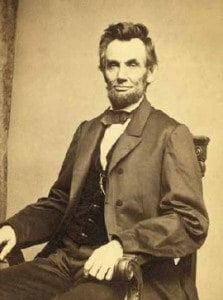LOS ANGELES (JTA)—We need to celebrate a Lincoln Chanukah this year.
It’s not because of the new Spielberg movie—that gives us something to do on Christmas Day—but because of the 150th anniversary of a little-known event in American history that threatened to expel a portion of the Civil War-era Jewish population from their homes on the Festival of Lights.
On Dec. 17, 1862, during the height of the war, Gen. Ulysses S. Grant issued General Orders 11 expelling “Jews as a class” from a war zone that included areas of Tennessee, Mississippi and Kentucky within a 24-hour period. It was the first day of Chanukah.
At the time, Chanukah was not the major holiday it is now. But Grant’s order, if carried out, meant that entire families would be uprooted during the holiday and beyond, and exiled from their communities.
Today, relaxing at home with family on Chanukah, retelling the Maccabee story that takes place in a far-off time and land, it’s uncomfortable to imagine a different story about freedom that hits much closer to home.
On that day, Grant was attempting to cut off the black market sale of southern cotton, in which some Jewish and other traders were engaged.
As researched in the engaging new book When General Grant Expelled the Jews by the prominent historian Jonathan D. Sarna, Grant’s order was enforced in several towns in Union hands, including Paducah, Ky.; Holly Springs, Miss.; and Trenton, Tenn., among others.
“Only a few Jews were seriously affected by General Orders 11,” perhaps fewer than 100, according to Sarna, but news of the order and the resulting outrage was quickly spread by The Associated Press.
The B’nai B’rith sent a petition to Washington calling upon President Lincoln to “annul” the order. Other Jewish leaders moved to organize delegations to meet with Lincoln. A Jewish merchant from Paducah named Cesar Kaskel traveled to Washington on a mission to have the order overturned. Upon arrival he was able to arrange through an Ohio congressman a meeting with the president.
According to an account of the meeting that Sarna says is often quoted but most likely embellished, Lincoln, using biblical imagery, asked Kaskel, “And so the children of Israel were driven from the happy land of Canaan?” In response, Kaskel asks for “Father Abraham’s” protection, to which Lincoln replies, “And this protection they shall have at once.”
The reality seems to have been that when Lincoln finally heard of Grant’s order, he ordered the general in chief of the Army to countermand it.
An account by the prominent Cincinnati Rabbi Isaac Mayer Wise, who also had met with the president about the issue, provides Lincoln’s rationale: “I do not like to hear a class or nationality condemned on account of a few sinners.”
This Chanukah, then, with Lincoln in the air, how should his action to rescind what Sarna cites as “the most sweeping anti-Jewish regulation in all American History” be commemorated?
How about devise a stovepipe hat menorah? Fry up four score latkes or change the lyrics of the modern classic Peter Paul & Mary Chanukah song to “Light one candle for the Tennessee Children?”
Not necessary.
Jews going back to Lincoln’s presidency have found ways to connect before. After his assassination, expressing their sorrow, many rabbis delivered sermons that were collected in a book by Emanuel Hertz titled Abraham Lincoln: The Tribute of the Synagogue. The basis for the Library of Congress’ Alfred Whital Stern Collection of Lincolniana was donated by Alfred Stern, a Chicago businessman. There’s even a Lincoln Street in Jerusalem.
Continuing the connection is this year’s Steven Spielberg film about Lincoln’s role in the passage of the 13th Amendment to the U.S. Constitution that abolished slavery. Watching the film is an excellent way at Chanukah time to rededicate an interest in Lincoln’s heart, humor and wisdom.
Another film, Saving Lincoln by director Salvador Litvak, approaches the Lincoln story through the eyes of his bodyguard. It might prove another way to light up a Chanukah night.
Sarna’s book would be good for any night of the holiday, which many see as a struggle for freedom. And, it is a reminder that the dreidel’s message—“a great miracle happened here”—can apply to the U.S. as well.
“In the end, General Orders 11 greatly strengthened America’s Jewish community,” Sarna writes. “The successful campaign to overturn the order made Jews more confident.” And Grant, to “repent” and to “rehabilitate himself with the Jewish community” during his two terms as president “appointed more Jews to office than had any of his predecessors.”
This Chanukah, when standing before lit chanukiyot reciting Hanerot Halalu, “These lights which we kindle recall the wondrous triumphs and the miraculous victories,” perhaps it is good to also recall the victories here of Cesar Kaskel, Rabbi Wise and ultimately Abraham Lincoln, who protected Jewish freedom.
So maybe they weren’t exactly American Maccabees—but Maccabee style for sure.
by Edmon J. Rodman
—Edmon J. Rodman is a JTA columnist who writes on Jewish life from Los Angeles. Contact him at edmojace@gmail.com.

